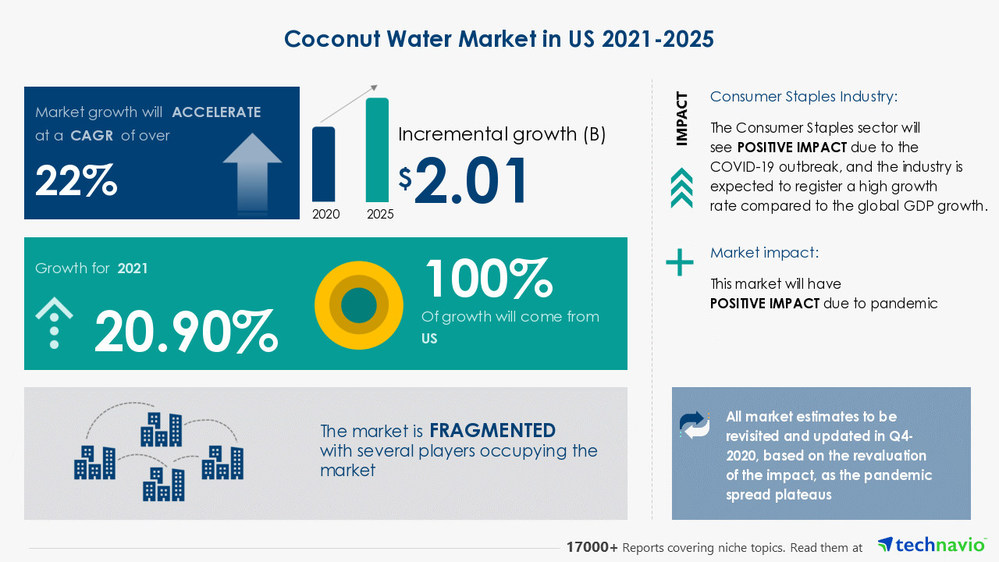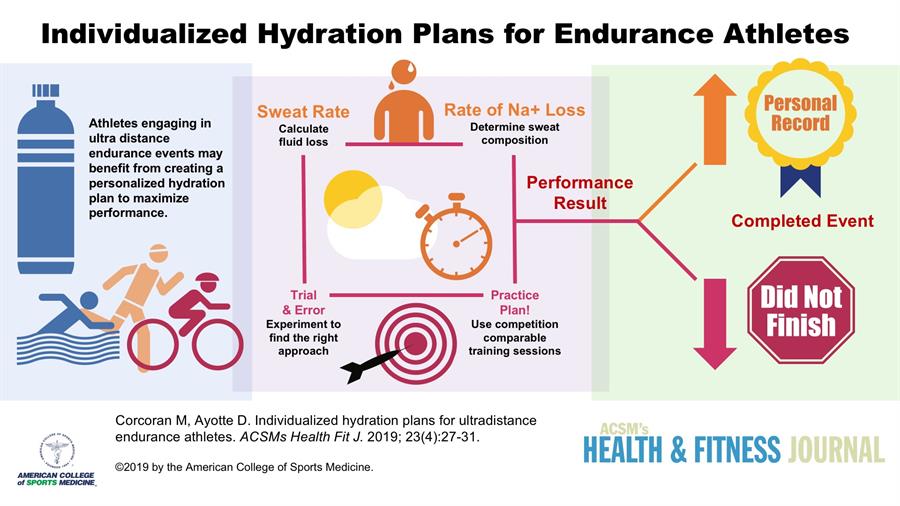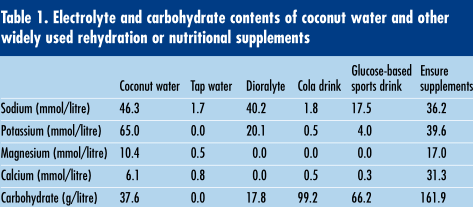Coconut water is a widely marketed drink for rehydration and hydration. From 2021 to 2025, the coconut water market in the United States is estimated to grow by $2.01 billion, with a compound annual growth rate of 22%! Athletes and fitness lovers make up a significant portion of this market, and much of the marketing of coconut water is based on its benefits for hydration and rehydration from exercise sessions.
Coconut water’s popularity and growth potential in the United States make it a particularly important beverage to look at and learn about.

Technavio has announced its latest market research report titled Coconut Water Market in US by Product, Distribution Channel, and Flavor – Forecast and Analysis 2021-2025
Most importantly, the viability of coconut water as a beneficial drink during and after exercise warrants further research and strong consideration before being recommended to athletes.
Coconut water is a “natural” beverage, but it is low in sodium and very high in potassium. Coconut water does have natural isotonic properties and can contribute to euhydration throughout 24-hour cycles.
Still, there are additional considerations for whether or not it should be consumed during and immediately after exercise sessions.
For you, as a trusted source of information for athletes on what beverages are best to drink during and after exercise to either rehydrate or adequately remain hydrated, having a deeper knowledge about the advantages and disadvantages of drinking coconut water will be very useful, especially since there is a strong chance your athletes will have seen the marketing for coconut water and be interested in trying it.
Determining whether coconut water is one of the best hydration drinks is important because it can directly impact your athletes’ health, safety, and performance.
Whether your athletes are endurance or ultra-endurance athletes (as depicted in the image below), team sport athletes, or another form of athlete, hydration choices can make huge differences.

Let’s take a look at the evidence surrounding the use of coconut water as a hydration beverage, and help you find a clear answer for the next time an athlete you are working with asks whether or not coconut water is a good choice for them before, during, or after exercise!
Advantages of Coconut Water for Hydration
Coconut water is unique as a source of hydration for athletes as it has both beneficial and detrimental properties. Coconut water possesses multiple beneficial properties, such as an adequate amount of carbohydrates and a pleasant taste that allows for large amounts of consumption.
A study that compared fresh young coconut water (CW), a carbohydrate-electrolyte beverage (CEB), and plain water (PW) for rehydration and blood volume restoration during a two-hour rehydration period following exercise-induced dehydration provided evidence of the beneficial aspects of coconut water as a hydration beverage. The study concluded that coconut water intake resulted in higher plasma glucose concentrations than plain water, caused less nausea, fullness, and upset stomach issues than plain water or the CEB, and supported whole-body rehydration to the same extent as both other beverages.
However, the evidence provided in this study was contradicted in a later study where participants indicated more bloating and greater stomach upset with coconut water consumption.
A key factor in supporting hydration for athletes is getting the athlete to adequately drink enough water-containing fluid. As evidenced by the study noted above, coconut water provides ample water volume to provide hydration support for exercise.
Therefore, if the athlete tolerates coconut water well and feels that coconut water consumption is comfortable and enjoyable, it can serve a role in maintaining athlete hydration.
Disadvantages of Coconut Water for Hydration
There are a few advantages of coconut water as a hydration beverage for athletes, but as I mentioned before, coconut water is very low in sodium and very high in potassium.
Although most people do not consume enough potassium in their diets and consuming more potassium is generally beneficial, consuming a disproportionate amount of potassium compared to sodium during and immediately following exercise can increase the risk of multiple health problems, including dehydration and hyperkalemia.

Unlike sodium-rich beverages, research indicates that potassium-rich coconut water does not provide additional hydration benefits compared to other sports beverages or plain water. Additional research has also demonstrated that coconut water consumption does not have beneficial effects on cycling time trial performance, indicating that coconut water will not provide ergogenic support for athletes in competition.
Since coconut water is costly in many parts of the world, spending more money on a coconut water beverage instead of a carbohydrate and sodium-rich sports drink or plain water does not necessarily make sense.
Furthermore, hyperkalemia is a significant risk of consuming coconut water as a rehydration drink. Hyperkalemia is a potentially life-threatening electrolyte disorder in which extracellular potassium concentrations dramatically rise and is usually only seen in individuals with chronic kidney disease, diabetes, heart failure, or those using certain medications such as renin-angiotensin-aldosterone system (RAAS) inhibitors and nonsteroidal anti-inflammatory drugs.
However, cases of “Death by Coconut” and coconut water induced hyperkalemia have been noted in individuals who accompany exercise-induced dehydration with the use of significant consumption of coconut water as a sole rehydration beverage.
Although coconut water provides beneficial nutrients and is a pleasantly consumed drink, athletes must be very cautious when consuming coconut water as a rehydration beverage. In addition, as a trusted source of information, you must be cautious about advising its use.
So, Should Coconut Water Be Advised for Athletes or Not?

You have learned about the advantages and disadvantages of coconut water for athletes, but now it’s time to develop a concrete theory about using it as a hydration option.
Coconut water is heavily marketed as an excellent sports drink for athletes. Still, there remain many questions about its validity and whether or not athletes should choose coconut water over regular water or sports drinks.
Coconut water is an excellent source of potassium for the diet and has a desirable flavor that makes consumption easy. Furthermore, potassium is one of the most under-consumed micronutrients, and it plays an integral role in blood pressure control and many other aspects of general health.
Therefore, we suggest coconut water be advised as a drink that can be consumed anytime preceding two hours before training or competition and four hours after training or competition.
Additionally, coconut water should be further avoided on days of intense sweating, especially for athletes that are “salty sweaters.” Sodium is the most abundant electrolyte in sweat, so athletes who produce particularly salty (sodium-latent) sweat should avoid coconut water around their training sessions and competitions in lieu of sodium-rich beverages that will not further disrupt the precious potassium-sodium balance necessary for adequate hydration.
Coconut water can certainly be advised as a beneficial beverage and an overall healthy drink. Still, its consumption should be reserved for the time frames mentioned earlier.
Determining the best hydration beverage for an athlete is a multifactorial process. As a trusted source of information, you need to make several calculations before advising for or against any specific beverage.
The information above should make you more comfortable advising athletes on the consumption of coconut water.

References
Corcoran, M., & Ayotte, D. (2019). Individualized hydration plans for ultradistance endurance athletes. ACSMʼs Health & Fitness Journal, 23(4), 27–31. https://doi.org/10.1249/fit.0000000000000490
Evans, G. H., James, L. J., Shirreffs, S. M., & Maughan, R. J. (2017). Optimizing the restoration and maintenance of fluid balance after exercise-induced dehydration. Journal of Applied Physiology, 122(4), 945–951. https://doi.org/10.1152/japplphysiol.00745.2016
Hakimian, J., Goldbarg, S. H., Park, C. H., & Kerwin, T. C. (2014). Death by coconut. Circulation: Arrhythmia and Electrophysiology, 7(1), 180–181. https://doi.org/10.1161/circep.113.000941
Intan Kailaku, S., Nur Alam Syah, A., Risfaheri, R., Setiawan, B., & Sulaeman, A. (2015). Carbohydrate-electrolyte characteristics of coconut water from different varieties and its potential as a natural isotonic drink. International Journal on Advanced Science, Engineering and Information Technology, 5(3), 174. https://doi.org/10.18517/ijaseit.5.3.515
Kalman, D. S., Feldman, S., Krieger, D. R., & Bloomer, R. J. (2012). Comparison of coconut water and a carbohydrate-electrolyte sport drink on measures of hydration and physical performance in exercise-trained men. Journal of the International Society of Sports Nutrition, 9(1), 1. https://doi.org/10.1186/1550-2783-9-1
Montford, J. R., & Linas, S. (2017). How dangerous is hyperkalemia? Journal of the American Society of Nephrology, 28(11), 3155–3165. https://doi.org/10.1681/asn.2016121344
Peart, D. J., Hensby, A., & Shaw, M. P. (2017). Coconut water does not improve markers of hydration during sub-maximal exercise and performance in a subsequent time trial compared with water alone. International Journal of Sport Nutrition and Exercise Metabolism, 27(3), 279–284. https://doi.org/10.1123/ijsnem.2016-0121
Pérez-Idárraga, A., & Aragón-Vargas, L. F. (2014). Postexercise rehydration: potassium-rich drinks versus water and a sports drink. Applied Physiology, Nutrition, and Metabolism, 39(10), 1167–1174. https://doi.org/10.1139/apnm-2013-0434
Rees, R. N., Barnett, J., Marks, D. J., & George, M. J. (2012). Coconut water-induced hyperkalaemia. British Journal of Hospital Medicine, 73(9), 534–534. https://doi.org/10.12968/hmed.2012.73.9.534
Saat, M., Singh, R., Sirisinghe, R. G., & Nawawi, M. (2002). Rehydration after exercise with fresh young coconut water, carbohydrate-electrolyte beverage and plain water. Journal of Physiological Anthropologyand Applied Human Science, 21(2), 93–104. https://doi.org/10.2114/jpa.21.93
Staruschenko, A. (2018). Beneficial effects of high potassium. Hypertension, 71(6), 1015–1022. https://doi.org/10.1161/hypertensionaha.118.10267
Technavio. (2021, August 20). Coconut Water Market in the US | Analysing Growth in Packaged Foods & Meats Industry | Technavio. Www.prnewswire.com. https://www.prnewswire.com/news-releases/coconut-water-market-in-the-us–analysing-growth-in-packaged-foods–meats-industry—technavio-301359313.html
Yong, J. W., Ge, L., Ng, Y. F., & Tan, S. N. (2009). The chemical composition and biological properties of coconut (Cocos nucifera L.) water. Molecules, 14(12), 5144–5164. https://doi.org/10.3390/molecules14125144
